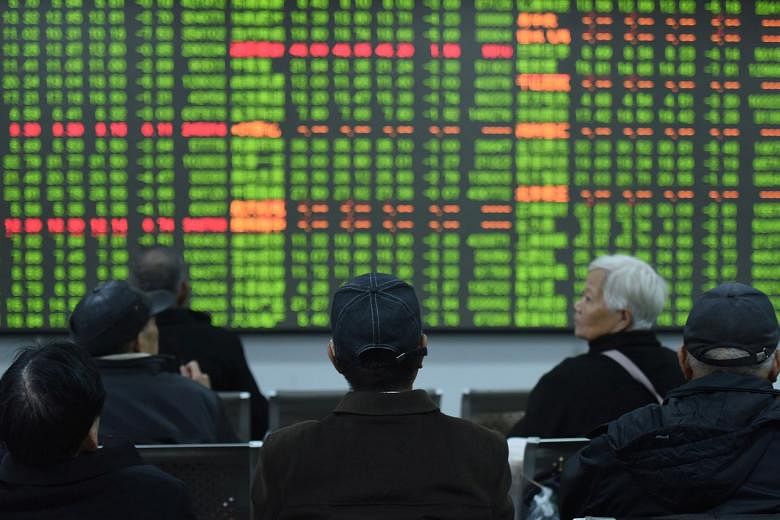Investors across Asia fled for the exits yesterday after China's financial markets plunged by its biggest drop in five years on the back of heightened fears over the coronavirus.
China had tried to ward off panic selling before trading resumed after an extended Chinese New Year break through injections of liquidity and restricting selling by brokerages.
The measures did seem to temper some of the panic in Shanghai and Shenzhen, which were down by as much as 9 per cent at one point, closing around 8 per cent lower.
The red tide washed over most of Asia, with Singapore and Taiwan each losing around 1.2 per cent, while Japan and Thailand shed a little over 1 per cent. Jakarta and Malaysia also closed lower although Hong Kong edged up 0.2 per cent.
Mr Liu Jinshu from Tayrona Financial, the equity research firm formerly known as NRA Capital, said: "Investors are waiting for the number of new cases to start to drop, as that will be a sign that the markets are about to bottom out. But there may be more selling if global growth gets adjusted downwards."
Maybank Kim Eng senior economist Chua Hak Bin noted that Singapore's coronavirus containment measures are "more drastic" than during the severe acute respiratory syndrome (Sars) crisis.
"Singapore is now sacrificing growth for the sake of containment of the disease. Because China is much larger now in terms of its economy and tourism impact, we should expect the spillover from its slowdown to be magnified. Singapore's manufacturing and export numbers in the coming months will likely capture some of that," Dr Chua said.
"Singapore's higher dependence on China's foreign workers, relative to the Sars period, may also disrupt domestic activities, including construction and manufacturing."
Investors are now trying to assess the economic impact of the new border controls here, as these have "blocked a lot of business connections between Singapore and China", CMC Markets analyst Margaret Yang said.
Last Friday, it was announced that Singapore would bar entry or transit here for all travellers arriving from China who have been there in the past 14 days. Singaporeans, permanent residents and long-term-pass holders, as well as work pass holders returning from China, will be placed on a leave of absence of 14 days.
"It took six months for the Sars virus to disappear. But the Wuhan virus is spreading faster than Sars, so it may last for months. The turning point will come when the number of new cases per day starts to drop," Ms Yang added.
Singapore hospitality real estate investment trusts (Reits) were among those that bore the brunt of yesterday's selling as the travel ban is expected to have "significant wide-ranging impact on tourism-sensitive industries like hotels and tourist-focused shopping malls", DBS Equity Research analysts said.
Far East Hospitality Trust lost 2.21 per cent while CDL Hospitality Trusts shed 1.28 per cent. Both have sizeable exposure to Singapore's hotel sector.
China accounts for close to 20 per cent of total visitor arrivals. Chinese tourists are also one of the largest spenders here.
DBS Equity Research anticipates "a near-term 4 per cent to 8 per cent drop in (hotel) occupancies, assuming a three-to six-month travel ban".
Property stocks continued to be sold down. CapitaLand dropped 1.93 per cent, UOL Group lost 1.88 per cent and City Developments shed 1.42 per cent.












